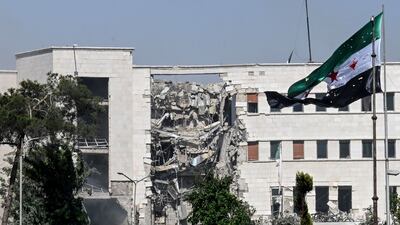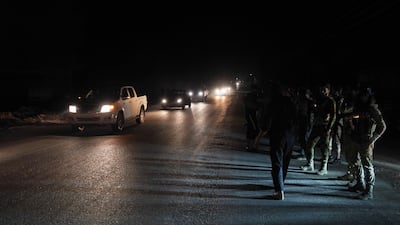Government troops and allied militias began withdrawing from the mostly Druze city of Sweida in southern Syria on Thursday, after Israeli strikes to defend the sect and US demands on Damascus to pull out.
“Withdrawal of the Syrian Arab Army from Sweida has begun,” Syria's state news agency said. The army's mission to pursue lawless groups had ended and an agreement was reached with some Druze figures, it added. Residents said some of the attacking forces had pulled out but others remained, mainly in the city's southern districts and at the main hospital.
Late on Wednesday, US State Department spokeswoman Tammy Bruce said Washington had called on the Syrian government “to withdraw their military, in order to allow all sides to be able to de-escalate”.
Syrian authorities then announced an “immediate and complete halt” to their offensive and a ceasefire with some but not all representatives of the Druze community. The deal came hours after Israel launched air strikes on Damascus.
It is the second time since April that outside intervention has halted major attacks against the Druze, a minority of several hundred thousand in Syria who follow an offshoot of Islam that is also present in Israel, Jordan and Lebanon.
Sources in Jordan, which borders the wider province of Sweida, said several hundred government troops and auxiliaries remained in the city on Thursday, including snipers still in central neighbourhoods. But talks were under way with Sweida's Druze defenders over their departure, the sources added. The city is now mostly back under the control of Druze groups loyal to Sheikh Hikmat Al Hijri, the main figure in a triumvirate that constitutes the spiritual leadership of the sect.
A four-day offensive in Sweida by elite Syrian government forces, including sniper units, night mission brigades and allied militias, has since Sunday killed more than 200 Druze, including civilians. Among them were at least a dozen men who were executed after forces loyal to the government stormed buildings, according to the sources in Jordan.
Israel strikes Damascus – in pictures
Etana, a research and policy centre in Amman specialising in Syrian affairs, said it had received reports of 200 abductions of civilians in Sweida by pro-government militias, who have been a major component of the offensive. Those abducted were taken to nearby Deraa, the reports said.
The attacking forces included about 450 foreign fighters posted by the government in Sweida. Among them are members of the ultra-hardline Turkistan Islamic Party. “This contingent are already being accused of various violations against local civilians,” Etana said.
A senior western diplomat in Amman said Syrian President Ahmad Al Shara had “overplayed his hand” by apparently calculating that the US would value newly developed ties with his government enough to give his forces a free hand in Sweida.
“The Americans could not let the pogrom in Sweida continue,” the diplomat said. Another factor was Israeli army pressure, the diplomat added, which was partly driven by increased agitation among the Druze minority in Israel about the killing of their co-religionists in Sweida.
Israel had responded to demands by Sheikh Mouaffaq Tarif, leader of Israel's Druze minority, to intervene more forcefully in Syria to stop the government offensive, the diplomat said.
Syrian militias forcibly shave men's moustaches in Druze heartland
On Wednesday, Israel widened its air strikes on Syria, with attacks on the main military compounds in central Damascus.
Israeli Prime Minister Benjamin Netanyahu said the Syrian regime had been “massacring” the Druze and repeated an insistence that the whole area south of Damascus, from the Golan Heights to the Druze Mountains, must be “demilitarised”.
“We acted, and we will continue to act as necessary,” he said.
In April, Israel also intervened militarily to halt attacks by government militias in which dozens of Druze were killed in Damascus and Sweida.
Mr Al Shara said the latest Israeli attacks constituted “a wide-scale targeting of civilian and government facilities”. But he also said those behind the violence against the Druze would be held accountable. “We are keen on holding accountable those who transgressed and abused our Druze people,” he said in a televised address early on Thursday.
Suwayda 24, a network of local journalists, said some pro-government troops remained in southern districts of Sweida on Thursday carrying out looting, amid fears of more street killings.
The main hospital in the city has been captured by the army, with bodies, mostly from the Druze community, scattered in the hallways after the morgue became full, the journalist network said.
The Druze's spiritual leadership in Syria, led by Sheikh Al Hijri, has been critical of Hayat Tahrir Al Sham, the splinter group of Al Qaeda that formed the new Syrian government under Mr Al Shara last year after ousting former president Bashar Al Assad. Mr Al Hijri, previously a key figure in a civil disobedience movement against the Assad regime, has labelled the new government extremist and anti-democratic.
Mr Al Hijri said he was not part of the ceasefire deal with government troops announced on Thursday. But many of Mr Al Hijri's Druze critics, who previously advocated accommodating the HTS government, have now coalesced around him.
Among them is Maher Sharfeddine, a writer and politician, who said he is “hand in hand with the victory leader”, referring to Mr Al Hijri.
Mr Sharafeddine said government forces had left behind in Sweida “a trail of atrocities that will become a lesson for us, before we rush again to partner” with Damascus.
Many Druze have opposed attempts by the government to station security forces from outside the area in Sweida, saying such personnel should be drawn from the local population.
Sweida is home to most of Syria's registered 800,000 Druze. But many have left, particularly during the country's 13-year civil war, with about 270,000 remaining in the province.
COMPANY PROFILE
Name: Rain Management
Year started: 2017
Based: Bahrain
Employees: 100-120
Amount raised: $2.5m from BitMex Ventures and Blockwater. Another $6m raised from MEVP, Coinbase, Vision Ventures, CMT, Jimco and DIFC Fintech Fund
THE APPRENTICE
Director: Ali Abbasi
Starring: Sebastian Stan, Maria Bakalova, Jeremy Strong
Rating: 3/5
Western Region Asia Cup T20 Qualifier
Sun Feb 23 – Thu Feb 27, Al Amerat, Oman
The two finalists advance to the Asia qualifier in Malaysia in August
Group A
Bahrain, Maldives, Oman, Qatar
Group B
UAE, Iran, Kuwait, Saudi Arabia
EVIL%20DEAD%20RISE
%3Cp%3E%3Cstrong%3EDirector%3A%20%3C%2Fstrong%3ELee%20Cronin%3Cbr%3E%3Cstrong%3EStars%3A%20%3C%2Fstrong%3EAlyssa%20Sutherland%2C%20Morgan%20Davies%2C%20Lily%20Sullivan%3Cbr%3E%3Cstrong%3ERating%3A%3C%2Fstrong%3E%205%2F5%3C%2Fp%3E%0A
Cricket World Cup League Two
Teams
Oman, UAE, Namibia
Al Amerat, Muscat
Results
Oman beat UAE by five wickets
UAE beat Namibia by eight runs
Namibia beat Oman by 52 runs
UAE beat Namibia by eight wickets
Fixtures
Saturday January 11 - UAE v Oman
Sunday January 12 – Oman v Namibia
Favourite things
Luxury: Enjoys window shopping for high-end bags and jewellery
Discount: She works in luxury retail, but is careful about spending, waits for sales, festivals and only buys on discount
University: The only person in her family to go to college, Jiang secured a bachelor’s degree in business management in China
Masters: Studying part-time for a master’s degree in international business marketing in Dubai
Vacation: Heads back home to see family in China
Community work: Member of the Chinese Business Women’s Association of the UAE to encourage other women entrepreneurs
ONCE UPON A TIME IN GAZA
Starring: Nader Abd Alhay, Majd Eid, Ramzi Maqdisi
Directors: Tarzan and Arab Nasser
Rating: 4.5/5
COMPANY%20PROFILE
%3Cp%3E%3Cstrong%3ECompany%20name%3C%2Fstrong%3E%3A%20ASI%20(formerly%20DigestAI)%3C%2Fp%3E%0A%3Cp%3E%3Cstrong%3EStarted%3A%3C%2Fstrong%3E%202017%3C%2Fp%3E%0A%3Cp%3E%3Cstrong%3EFounders%3A%3C%2Fstrong%3E%20Quddus%20Pativada%3C%2Fp%3E%0A%3Cp%3E%3Cstrong%3EBased%3A%3C%2Fstrong%3E%20Dubai%2C%20UAE%3C%2Fp%3E%0A%3Cp%3E%3Cstrong%3EIndustry%3A%3C%2Fstrong%3E%20Artificial%20intelligence%2C%20education%20technology%3C%2Fp%3E%0A%3Cp%3E%3Cstrong%3EFunding%3A%3C%2Fstrong%3E%20%243%20million-plus%3C%2Fp%3E%0A%3Cp%3E%3Cstrong%3EInvestors%3A%3C%2Fstrong%3E%20GSV%20Ventures%2C%20Character%2C%20Mark%20Cuban%3C%2Fp%3E%0A
JOKE'S%20ON%20YOU
%3Cp%3EGoogle%20wasn't%20new%20to%20busting%20out%20April%20Fool's%20jokes%3A%20before%20the%20Gmail%20%22prank%22%2C%20it%20tricked%20users%20with%20%3Ca%20href%3D%22https%3A%2F%2Farchive.google%2Fmentalplex%2F%22%20target%3D%22_blank%22%3Emind-reading%20MentalPlex%20responses%3C%2Fa%3E%20and%20said%3Ca%20href%3D%22https%3A%2F%2Farchive.google%2Fpigeonrank%2F%22%20target%3D%22_blank%22%3E%20well-fed%20pigeons%20were%20running%20its%20search%20engine%20operations%3C%2Fa%3E%20.%3C%2Fp%3E%0A%3Cp%3EIn%20subsequent%20years%2C%20they%20announced%20home%20internet%20services%20through%20your%20toilet%20with%20its%20%22%3Ca%20href%3D%22https%3A%2F%2Farchive.google%2Ftisp%2Finstall.html%22%20target%3D%22_blank%22%3Epatented%20GFlush%20system%3C%2Fa%3E%22%2C%20made%20us%20believe%20the%20Moon's%20surface%20was%20made%20of%20cheese%20and%20unveiled%20a%20dating%20service%20in%20which%20they%20called%20founders%20Sergey%20Brin%20and%20Larry%20Page%20%22%3Ca%20href%3D%22https%3A%2F%2Farchive.google%2Fromance%2Fpress.html%22%20target%3D%22_blank%22%3EStanford%20PhD%20wannabes%3C%2Fa%3E%20%22.%3C%2Fp%3E%0A%3Cp%3EBut%20Gmail%20was%20all%20too%20real%2C%20purportedly%20inspired%20by%20one%20%E2%80%93%20a%20single%20%E2%80%93%20Google%20user%20complaining%20about%20the%20%22poor%20quality%20of%20existing%20email%20services%22%20and%20born%20%22%3Ca%20href%3D%22https%3A%2F%2Fgooglepress.blogspot.com%2F2004%2F04%2Fgoogle-gets-message-launches-gmail.html%22%20target%3D%22_blank%22%3Emillions%20of%20M%26amp%3BMs%20later%3C%2Fa%3E%22.%3C%2Fp%3E%0A
Wicked: For Good
Director: Jon M Chu
Starring: Ariana Grande, Cynthia Erivo, Jonathan Bailey, Jeff Goldblum, Michelle Yeoh, Ethan Slater
Rating: 4/5
'Saand Ki Aankh'
Produced by: Reliance Entertainment with Chalk and Cheese Films
Director: Tushar Hiranandani
Cast: Taapsee Pannu, Bhumi Pednekar, Prakash Jha, Vineet Singh
Rating: 3.5/5 stars
COMPANY%20PROFILE
%3Cp%3E%3Cstrong%3EName%3A%3C%2Fstrong%3E%20Carzaty%2C%20now%20Kavak%3Cbr%3E%3Cstrong%3EBased%3A%3C%2Fstrong%3E%20Dubai%3Cbr%3E%3Cstrong%3ELaunch%20year%3A%20%3C%2Fstrong%3ECarzaty%20launched%20in%202018%2C%20Kavak%20in%20the%20GCC%20launched%20in%202022%3Cbr%3E%3Cstrong%3ENumber%20of%20employees%3A%3C%2Fstrong%3E%20140%3Cbr%3E%3Cstrong%3ESector%3A%3C%2Fstrong%3E%20Automotive%3Cbr%3E%3Cstrong%3EFunding%3A%20%3C%2Fstrong%3ECarzaty%20raised%20%246m%20in%20equity%20and%20%244m%20in%20debt%3B%20Kavak%20plans%20%24130m%20investment%20in%20the%20GCC%3C%2Fp%3E%0A
The biog
Name: Shamsa Hassan Safar
Nationality: Emirati
Education: Degree in emergency medical services at Higher Colleges of Technology
Favourite book: Between two hearts- Arabic novels
Favourite music: Mohammed Abdu and modern Arabic songs
Favourite way to spend time off: Family visits and spending time with friends
Who is Mohammed Al Halbousi?
The new speaker of Iraq’s parliament Mohammed Al Halbousi is the youngest person ever to serve in the role.
The 37-year-old was born in Al Garmah in Anbar and studied civil engineering in Baghdad before going into business. His development company Al Hadeed undertook reconstruction contracts rebuilding parts of Fallujah’s infrastructure.
He entered parliament in 2014 and served as a member of the human rights and finance committees until 2017. In August last year he was appointed governor of Anbar, a role in which he has struggled to secure funding to provide services in the war-damaged province and to secure the withdrawal of Shia militias. He relinquished the post when he was sworn in as a member of parliament on September 3.
He is a member of the Al Hal Sunni-based political party and the Sunni-led Coalition of Iraqi Forces, which is Iraq’s largest Sunni alliance with 37 seats from the May 12 election.
He maintains good relations with former Prime Minister Nouri Al Maliki’s State of Law Coaliton, Hadi Al Amiri’s Badr Organisation and Iranian officials.
Results
4pm: Maiden (Dirt) Dh165,000 1,600m
Winner: Moshaher, Pat Dobbs (jockey), Doug Watson (trainer).
4.35pm: Handicap (D) Dh165,000 2,200m
Winner: Heraldic, Richard Mullen, Satish Seemar.
5.10pm: Maiden (Turf) Dh165,000 1,600m
Winner: Rua Augusta, Harry Bentley, Ahmad bin Harmash.
5.45pm: Handicap (D) Dh190,000 1,200m
Winner: Private’s Cove, Mickael Barzalona, Sandeep Jadhav.
6.20pm: Handicap (T) Dh190,000 1,600m
Winner: Azmaam, Jim Crowley, Musabah Al Muhairi.
6.55pm: Handicap (D) Dh190,000 1,400m
Winner: Bochart, Richard Mullen, Satish Seemar.
7.30pm: Handicap (T) Dh190,000 2,000m
Winner: Rio Tigre, Mickael Barzalona, Sandeep Jadhav.
UAE currency: the story behind the money in your pockets
Company%20profile
%3Cp%3E%3Cstrong%3EName%3A%3C%2Fstrong%3E%20JustClean%3Cbr%3E%3Cbr%3E%3Cstrong%3EBased%3A%20%3C%2Fstrong%3EDubai%20with%20offices%20in%20other%20GCC%20countries%3Cbr%3E%3Cbr%3E%3Cstrong%3ELaunch%20year%3A%3C%2Fstrong%3E%202016%3Cbr%3E%3Cbr%3E%3Cstrong%3ENumber%20of%20employees%3A%3C%2Fstrong%3E%20160%2B%20with%2021%20nationalities%20in%20eight%20cities%3Cbr%3E%3Cstrong%3E%3Cbr%3ESector%3A%3C%2Fstrong%3E%20online%20laundry%20and%20cleaning%20services%3Cbr%3E%3Cbr%3E%3Cstrong%3EFunding%3A%20%3C%2Fstrong%3E%2430m%20from%20Kuwait-based%20Faith%20Capital%20Holding%20and%20Gulf%20Investment%20Corporation%3C%2Fp%3E%0A
PREMIER LEAGUE FIXTURES
Saturday (UAE kick-off times)
Watford v Leicester City (3.30pm)
Brighton v Arsenal (6pm)
West Ham v Wolves (8.30pm)
Bournemouth v Crystal Palace (10.45pm)
Sunday
Newcastle United v Sheffield United (5pm)
Aston Villa v Chelsea (7.15pm)
Everton v Liverpool (10pm)
Monday
Manchester City v Burnley (11pm)
Who has lived at The Bishops Avenue?
- George Sainsbury of the supermarket dynasty, sugar magnate William Park Lyle and actress Dame Gracie Fields were residents in the 1930s when the street was only known as ‘Millionaires’ Row’.
- Then came the international super rich, including the last king of Greece, Constantine II, the Sultan of Brunei and Indian steel magnate Lakshmi Mittal who was at one point ranked the third richest person in the world.
- Turkish tycoon Halis Torprak sold his mansion for £50m in 2008 after spending just two days there. The House of Saud sold 10 properties on the road in 2013 for almost £80m.
- Other residents have included Iraqi businessman Nemir Kirdar, singer Ariana Grande, holiday camp impresario Sir Billy Butlin, businessman Asil Nadir, Paul McCartney’s former wife Heather Mills.
Hunting park to luxury living
- Land was originally the Bishop of London's hunting park, hence the name
- The road was laid out in the mid 19th Century, meandering through woodland and farmland
- Its earliest houses at the turn of the 20th Century were substantial detached properties with extensive grounds
Changing visa rules
For decades the UAE has granted two and three year visas to foreign workers, tied to their current employer. Now that's changing.
Last year, the UAE cabinet also approved providing 10-year visas to foreigners with investments in the UAE of at least Dh10 million, if non-real estate assets account for at least 60 per cent of the total. Investors can bring their spouses and children into the country.
It also approved five-year residency to owners of UAE real estate worth at least 5 million dirhams.
The government also said that leading academics, medical doctors, scientists, engineers and star students would be eligible for similar long-term visas, without the need for financial investments in the country.
The first batch - 20 finalists for the Mohammed bin Rashid Medal for Scientific Distinction.- were awarded in January and more are expected to follow.











